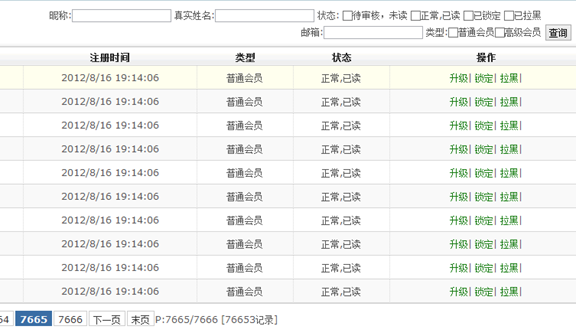*要解决的问题
需求总是改变,有的甚至不能叫需求,一个小小的请求:帮我加个"用户名"的查询条件吧,我想有"注册时间"范围查询,"三围"可以有吗?
我们需要一个简单,好用,强大的后台,那么这些可以有,应该有!
*怎么解决
因为一个小小请求的修改,都要修改cs程序,重新编译发布的项目,不是一个好项目,特别是一个大点的项目
,发布会出现版本问题,而请求人员希望问题马上可以得到解决,那么解决的方法就显而易见了:
只修改模板,满足查询,验证等问题:
关于模板里实现验证的方法请查看我的上篇博文ASP.NET MVC 3.0前后台统一验证类UniValidate,附源码
关于模板里实现动态查询,现在开始介绍:
我们要现实的功能很简单:通过增加表单控件就可以加入新的查询条件
类似的页面如下

*开始实现
我要实现一个直接接受form,生成动态查询的ef扩展
/// <summary>通过页面控件动态构建查询</summary>
public static IQueryable<TSource> WhereDynamic<TSource>(this IQueryable<TSource> source,
NameValueCollection nameValues) where TSource : class
重载扩展
public static IQueryable<TSource> WhereDynamic<TSource>(this IQueryable<TSource> source,
HttpRequestBase request) where TSource : class
{
return WhereDynamic(source, new NameValueCollection { request.QueryString, request.Form });
}
从这个方法出发,思路就很简单了,就是取得form里的值,动态构建表达式树,有的同学会有疑问,为什么不用对象做为参数
- 因为form的控件名字部分需要有查询关系的标注,名字与model名字不一致,这样要得到对象,要重写ModelBinder
- 表达树已经有了类型检查, ModelBinder也有,有重复,而且加大了复杂性.
生成表达树的代码
/// <summary>通过页面控件动态构建查询</summary>
public static IQueryable<TSource> WhereDynamic<TSource>(this IQueryable<TSource> source,
NameValueCollection nameValues) where TSource : class
{
if (nameValues.Count > 0)
{
//构建 c=>Body中的c
ParameterExpression param = Expression.Parameter(typeof(TSource), "c");
//构建c=>Body中的Body
var body = GetExpressoinBody(param, nameValues);
if (body != null)
{
//将二者拼为c=>Body
var expression = Expression.Lambda<Func<TSource, bool>>(body, param);
//传到Where中当做参数,类型为Expression<Func<T,bool>>
return source.Where(expression);
}
}
return source;
}
/// <summary>构建body</summary>
private static Expression GetExpressoinBody(ParameterExpression param, NameValueCollection nameValues)
{
var list = new List<Expression>();
if (nameValues.Count > 0)
{
var plist = param.Type.GetRuntimeProperties().ToDictionary(z => z.Name);//可以加缓存改善性能
foreach (var item in nameValues.AllKeys)
if (item.EndsWith(">"))//可能大小查询
{
string key = item.TrimEnd('>');
if (!plist.ContainsKey(key) || nameValues[item].Length <= 0) continue;
var rType = plist[key].GetMethod.ReturnType;
if (rType == typeof(string)) continue;
var e1 = Expression.Property(param, key);
object dValue;
if (TryParser(nameValues[item], rType, out dValue))
list.Add(Expression.GreaterThan(e1, Expression.Constant(dValue)));
}
else if (item.EndsWith("<"))//可能大小查询
{
string key = item.TrimEnd('<');
if (!plist.ContainsKey(key) || nameValues[item].Length <= 0) continue;
var rType = plist[key].GetMethod.ReturnType;
if (rType == typeof(string)) continue;
var e1 = Expression.Property(param, key);
object dValue;
if (TryParser(nameValues[item], rType, out dValue))
{
if (rType == typeof(DateTime)) dValue = ((DateTime)dValue).AddDays(1);
list.Add(Expression.LessThan(e1, Expression.Constant(dValue)));
}
}
else if (plist.ContainsKey(item) && nameValues[item].Length > 0)
{
var e1 = Expression.Property(param, item);
var rType = plist[item].GetMethod.ReturnType;
if (rType == typeof(string))//可能是like查询
{
var value = nameValues[item].Trim('%');
var e2 = Expression.Constant(value);
if (nameValues[item].Length - value.Length >= 2)
list.Add(Expression.Call(e1, "Contains", null, new Expression[] { e2 }));
else if (nameValues[item].StartsWith("%"))
list.Add(Expression.Call(e1, "EndsWith", null, new Expression[] { e2 }));
else if (nameValues[item].EndsWith("%"))
list.Add(Expression.Call(e1, "StartsWith", null, new Expression[] { e2 }));
else
list.Add(Expression.Equal(e1, e2));
}
else if (nameValues[item].IndexOf(",") > 0)//可能是in查询
{
if (rType == typeof(short))
{
var searchList = TryParser<short>(nameValues[item]);
if (searchList.Any())
list.Add(Expression.Call(Expression.Constant(searchList), "Contains", null, new Expression[] { e1 }));
}
else if (rType == typeof(int))
{
var searchList = TryParser<int>(nameValues[item]);
if (searchList.Any())
list.Add(Expression.Call(Expression.Constant(searchList), "Contains", null, new Expression[] { e1 }));
}
else if (rType == typeof(long))
{
var searchList = TryParser<long>(nameValues[item]);
if (searchList.Any())
list.Add(Expression.Call(Expression.Constant(searchList), "Contains", null, new Expression[] { e1 }));
}
}
else
{
object dValue;
if (TryParser(nameValues[item], rType, out dValue))
list.Add(Expression.Equal(e1, Expression.Constant(dValue)));
}
}
}
return list.Count > 0 ? list.Aggregate(Expression.AndAlso) : null;
}
只处理大于,小于,in,like,等于的操作,其他的可以自己添加,因为大于小于可能为同一个字段,所以查询关系标注在了名称里了
*其他函数,用于类型转换
private static List<T> TryParser<T>(string value)
{
string[] searchArray = value.Split(',');
List<T> dList = new List<T>();
foreach (var l in searchArray)
{
try
{
T dValue = (T)Convert.ChangeType(l, typeof(T));
dList.Add(dValue);
}
catch { }
}
return dList;
}
private static bool TryParser(string value, Type outType, out object dValue)
{
try
{
dValue = Convert.ChangeType(value, outType);
return true;
}
catch
{
dValue = null;
return false;
}
}
*动态处理分页
public static IQueryable<TSource> Page<TSource>(this IQueryable<TSource> source, DataPage dp) where TSource : class
{
dp.RowCount = source.Count();
Type type = typeof(TSource);
ParameterExpression param = Expression.Parameter(type, "c");
string callMethod = "OrderByDescending";
PropertyInfo property;
if (dp.OrderField == null)
property = type.GetRuntimeProperties().First();
else
{
//处理正反排序
string[] orderFileds = dp.OrderField.Split(' ');
if (orderFileds.Length == 2)
{
dp.OrderField = orderFileds[0].Trim();
if (String.Compare(orderFileds[1].Trim(), "asc", StringComparison.OrdinalIgnoreCase) == 0) callMethod = "OrderBy";
}
property = type.GetProperty(dp.OrderField) ?? type.GetRuntimeProperties().First();
}
LambdaExpression le = Expression.Lambda(Expression.MakeMemberAccess(param, property), param);
MethodCallExpression resultExp = Expression.Call(typeof(Queryable), callMethod, new[] { type, property.PropertyType }
, source.Expression, Expression.Quote(le));
return source.Provider.CreateQuery<TSource>(resultExp).Skip((dp.PageIndex - 1) * dp.PageSize).Take(dp.PageSize);
}
*如何使用,主要体现在表单里
名字<input name="username" type="text" style="width: 40px" />正常的查询,如果值里有%号处理成like查询
ID<input name="id" type="text" value="62" style="width: 30px" /><input name="id" type="text" value="63" style="width: 30px" /> in查询
时<input name="addtime>" type="text" value="" style="width: 80px" /><input name="addtime<" type="text" value="" style="width: 80px" /> 大于小于查询
Controller里的调用
public PartialViewResult WherePage(DataPage dp)
{
dp.PageSize = 10;
var tempList = _dbEntities.act_comment.WhereDynamic(Request).Page(dp);
ViewBag.sql = tempList.ToString();
return View(tempList.ToList());
}
Ef扩展的好处是查询条件可以串接,如上例可以再加查询条件
var tempList = _dbEntities.act_comment.WhereDynamic(Request).Where(z=>z.forid==1).Page(dp);
*其他
参考了重典 http://www.cnblogs.com/chsword/archive/2010/12/27/searchmodel_1.html ,原理相同,里面有的,我这都没有细说,比如比拼接sql的优点,
关于表达式树可以学习脑袋的: http://www.cnblogs.com/Ninputer/archive/2009/08/28/expression_tree1.html
代码是从老项目copy出来的,没有单独的项目,看需要,如果有必要,可以考虑整理一份源码,代码上面都有.